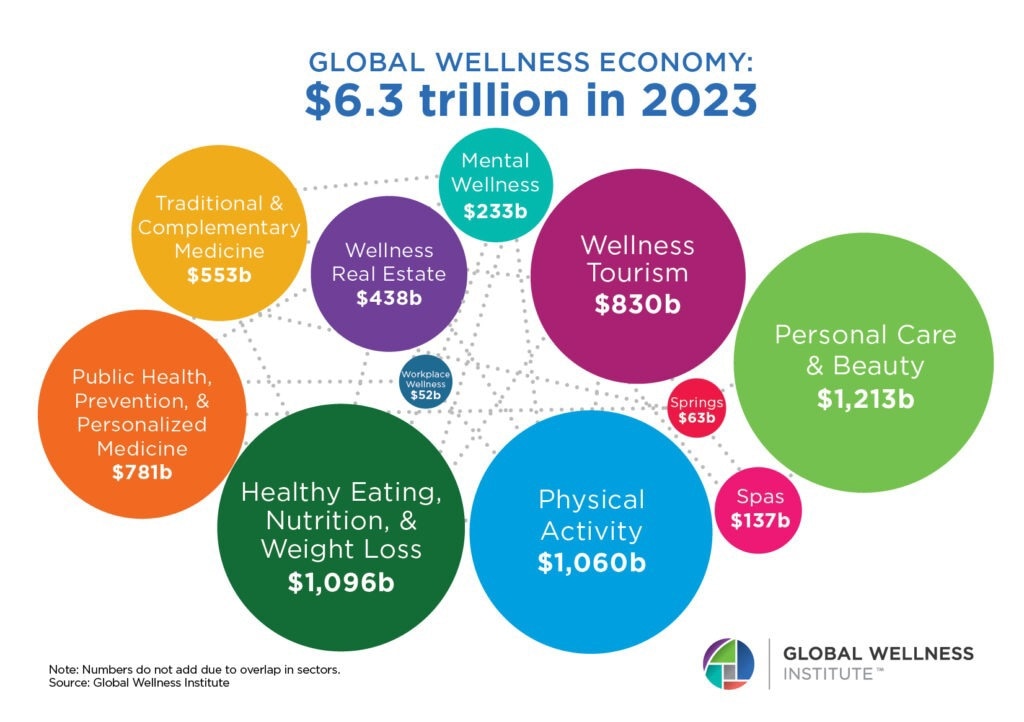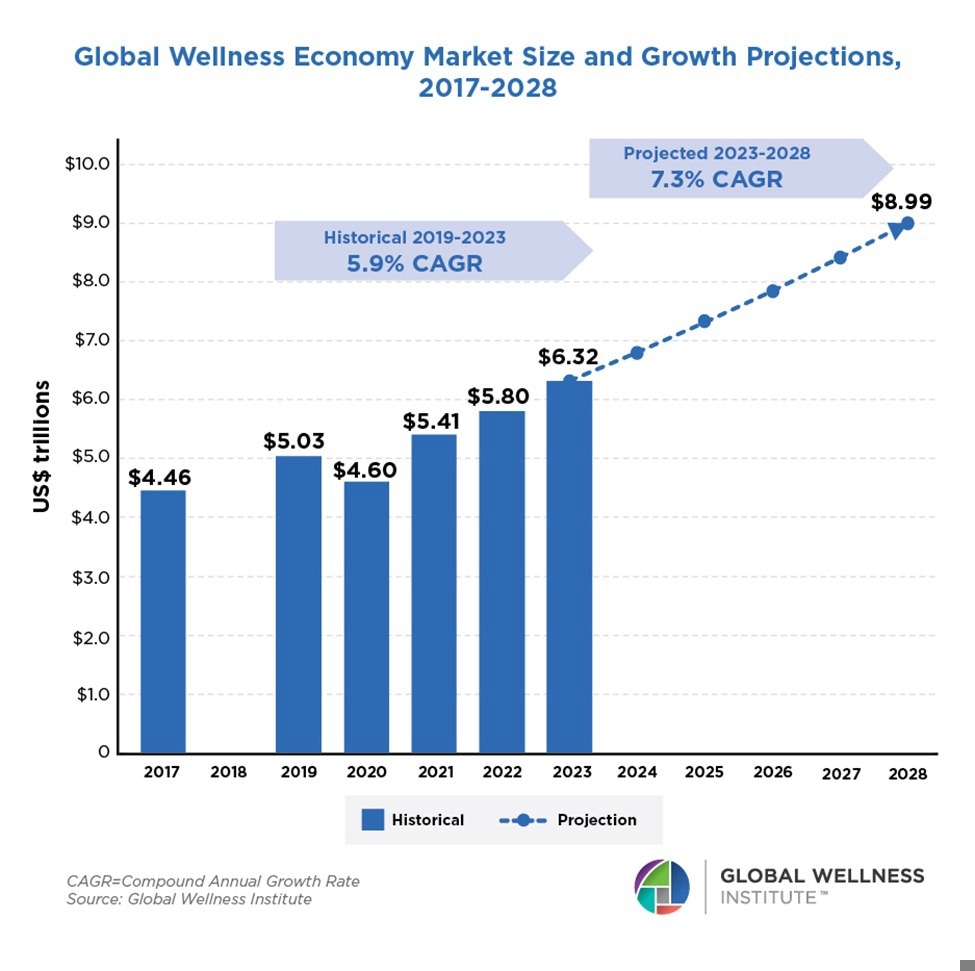Introduction
Scientific insights into consumer behavior
The role of digital technology
Evidence-based wellness products and services
Challenges in the wellness industry from a scientific perspective
Future directions
Conclusions
References
Further reading
Millennials and Gen Z are revolutionizing wellness by demanding science-backed solutions, digital innovation, and greater transparency, reshaping how health and self-care trends evolve in a fast-growing trillion-dollar industry.
 Image Credit: PeopleImages.com - Yuri A / Shutterstock.com
Image Credit: PeopleImages.com - Yuri A / Shutterstock.com
Introduction
The global wellness economy is currently valued at USD 6.3 trillion and is forecast to hit $9 trillion by 2028, with the United States accounting for nearly one-third of the market. This rapid growth is primarily driven by Millennials and Generation Z (Gen Z), many of whom consider wellness a daily priority, rather than an occasional indulgence.1,2
These younger consumers are reshaping industry trends through personalized, science-backed choices and a strong appetite for innovation, from mental health apps to wearable tech. Scientific research is essential to understanding these shifts, guiding businesses in aligning with evolving consumer demands.3,4

Source: Global Wellness Institute1
Scientific insights into consumer behavior
In a survey of over 7,500 individuals across six countries, 79% of respondents indicated that wellness is important to them, with 42% ranking it as a top priority. This generational pivot is reflected in rising spending on health-monitoring devices, meditation apps, personalized nutrition services, and clean beauty products.5
Quantitative data suggests a growing interest in wellness services, with more than one-third of consumers planning to increase spending on offerings such as coaching, therapy, and diet programs. These cohorts are also digitally fluent, with many relying on influencers and online platforms to guide wellness decisions.5
Psychological and sociological studies suggest that this focus on wellness is one part of a broader cultural movement that values self-care, sustainability, and authenticity. Consumers fall into distinct groups, from high-income wellness enthusiasts to price-conscious loyalists, each with unique motivations.5

Source: Global Wellness Institute1
The role of digital technology
Wellness apps, wearable devices, and digital health platforms enhance user participation by offering personalized insights, real-time tracking, and greater accessibility to health-related services. These tools promote better adherence to fitness, nutrition, and mental health routines by making wellness more interactive and tailored to individual needs.6
Behavioral science studies have also highlighted the powerful role of social media in shaping wellness choices. Platforms like Instagram, TikTok, and YouTube influence consumers, particularly Millennials and Gen Z, through peer recommendations, influencer endorsements, and trending health content. This exposure often leads to increased experimentation with wellness products and services, from fitness subscriptions to mindfulness apps.6
Trust is a critical element in the adoption of digital wellness tools. Digital platforms that prioritize clear, scientifically supported messaging are more likely to gain long-term user trust and loyalty, thus making them central to the evolving wellness landscape.6
The future of wellness: Connected and customized
Evidence-based wellness products and services
Supplements, fitness programs, and mental health apps are now supported by a growing body of evidence, including clinical trials and meta-analyses.
For example, mindfulness-based programs (MBPs), including practices such as meditation and breathing techniques, have been shown to improve symptoms of anxiety, depression, psychological distress, and overall mental well-being in nonclinical populations. In fact, a large-scale meta-analysis involving 136 randomized controlled trials and over 11,000 participants demonstrated that MBPs consistently outperformed no-treatment controls, offering small to moderate benefits across various mental health outcomes.7,8
Mental health interventions, such as mindfulness and meditation, which are often integrated into apps and community classes, have also become key elements in their wellness routines. These practices are not only grounded in ancient traditions but also have extensive empirical support for their effectiveness in improving mental well-being outside clinical settings. As this generation continues to drive wellness spending, the demand for transparent, research-backed services is likely to grow and change the marketplace around evidence-based care.7,8
Challenges in the wellness industry from a scientific perspective
Many popular wellness trends, from supplements to alternative therapies, continue to thrive despite a lack of accurate clinical evidence. Influencer-driven marketing, particularly on social media, often promotes unproven products by relying on testimonials rather than peer-reviewed data. This environment allows pseudoscientific claims to flourish, sometimes leading consumers to delay or forego evidence-based medical treatments.9,10
A key concern is the absence of strong regulatory oversight. In markets like the United States, dietary supplements can be sold without prior approval from the Food and Drug Administration, which increases the risk of adverse health outcomes and consumer mistrust.9,10
Many individuals lack the tools to distinguish between credible information and persuasive, but inaccurate, content. As a result, they may rely more on influencers than experts when making health decisions. To address these issues, stronger policies and public health research are needed to evaluate wellness claims, guide consumer behavior, and develop safeguards that prioritize safety, efficacy, and transparency.9,10
Future directions
The future of wellness is being shaped by emerging scientific disciplines, including personalized nutrition, microbiome research, and neuro-wellness. These fields are unlocking individual-specific insights that help tailor dietary plans, mental health interventions, and overall health strategies to an individual’s unique biology and behavior. For example, studies using genomics and microbiome profiling are enabling precision nutrition recommendations, whereas neuro-wellness innovations are enhancing mental resilience and cognitive performance.10,11
Collaboration between academia and the wellness industry plays a critical role in ensuring the scientific rigor of new products and services. Partnerships that combine clinical expertise with market insight foster translational research that is not innovative and practically applicable.
These alliances are helping to bridge the gap between lab discoveries and consumer applications, thereby accelerating the delivery of science-backed wellness innovations. As consumers continue to prioritize data-driven choices, the wellness industry must evolve by embedding credible science into every stage of development and communication.10,11
 Image Credit: Gorodenkoff / Shutterstock.com
Image Credit: Gorodenkoff / Shutterstock.com
Conclusions
As Millennials and Gen Z demand scientifically validated solutions, research continues to shape the direction of innovation and product development. Trust in wellness products and services is built through clinical validation, transparency, and credible communication.
Moving forward, sustained investment in research and collaboration with academic institutions will be crucial to maintaining integrity, guiding consumer choices, and ensuring that wellness trends remain grounded in science rather than fleeting fads.
References
- Global Wellness Institute. (2024, November 5). The Global Wellness Economy Reaches a New Peak of $6.3 Trillion--And Is Forecast to Hit $9 Trillion by 2028. Prweb.com. https://www.prweb.com/releases/the-global-wellness-economy-reaches-a-new-peak-of-6-3-trillionand-is-forecast-to-hit-9-trillion-by-2028--302295427.html
- Global Wellness Institute. (2024, November 5). The global wellness economy reaches a new peak of $6.3 trillion––and is forecast to hit $9 trillion by 2028 -. Global Wellness Institute. https://globalwellnessinstitute.org/press-room/press-releases/the-global-wellness-economy-reaches-a-new-peak-of-6-3-trillion-and-is-forecast-to-hit-9-trillion-by-2028/
- The $2 trillion global wellness market gets a millennial and Gen Z glow-up. McKinsey & Company (2025). https://www.mckinsey.com.br/industries/consumer-packaged-goods/our-insights/future-of-wellness-trends
- New Research Shows the US Wellness Economy—Valued at $2 Trillion— Now Represents One-Third of Entire Global Wellness Economy, Global Wellness Institute (March 4, 2025). https://globalwellnessinstitute.org/press-room/press-releases/gow-us-econ-valued-at-2trillion/
- Callaghan, S., Lösch, M., Pione, A., & Teichner, W., Feeling good: The future of the $1.5 trillion wellness market. McKinsey & Company (2021) https://www.mckinsey.com/~/media/mckinsey/industries/consumer%20packaged%20goods/our%20insights/feeling%20good%20the%20future%20of%20the%201%205%20trillion%20wellness%20market/feelinggoodthefutureofthe15trilliondollarwellnessmarket.pdf
- Kang, H. S., & Exworthy, M. (2022). Wearing the future—wearables to empower users to take greater responsibility for their health and care: scoping review. JMIR mHealth and uHealth, 10(7), e35684. DOI: 10.2196/35684, https://mhealth.jmir.org/2022/7/e35684
- Mind the Gap, McKinsey & Company (2025). https://www.mckinsey.com/featured-insights/mind-the-gap
- Galante, J., Friedrich, C., Dawson, A.F., Modrego-Alarcón, M., Gebbing, P., Delgado-Suárez, I., Gupta, R., Dean, L., Dalgleish, T., White, I.R. and Jones, P.B. (2021). Mindfulness-based programmes for mental health promotion in adults in nonclinical settings: A systematic review and meta-analysis of randomised controlled trials. PLoS medicine, 18(1), e1003481. DOI: 10.1371/journal.pmed.1003481, https://journals.plos.org/plosmedicine/article?id=10.1371/journal.pmed.1003481
- Allem, J. P. (2024). The Need for Research on the Wellness Industry's Impact on Health Decisions. American Journal of Preventive Medicine, 67(4), 627-630. DOI: 10.1016/j.amepre.2024.05.010, https://www.ajpmonline.org/article/S0749-3797(24)00166-1/fulltext
- Top wellness trends in 2024, McKinsey & Company (2024) https://www.mckinsey.com/industries/consumer-packaged-goods/our-insights/the-trends-defining-the-1-point-8-trillion-dollar-global-wellness-market-in-2024
- National Academies of Sciences, Engineering, and Medicine. 2022. Challenges and Opportunities for Precision and Personalized Nutrition: Proceedings of a Workshop. Washington, DC: The National Academies Press. DOI: 0.17226/26299, https://nap.nationalacademies.org/catalog/26299/challenges-and-opportunities-for-precision-and-personalized-nutrition-proceedings-of
Further Reading
Last Updated: Jun 23, 2025